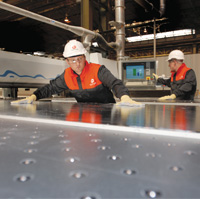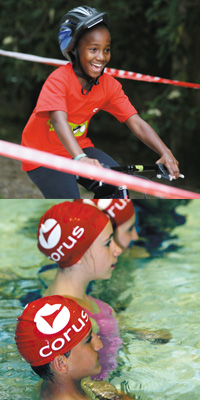International Operations

Technology developments for specific markets
 Corus employees at its
Corus employees at its
Living Solutions business. |
 Corus is British Triathlon’s main sponsor
Corus is British Triathlon’s main sponsor. |
Many development projects are aimed at tailoring product
properties to the needs of specific markets and customers.
Construction
Following a programme of technical improvements at its
Scunthorpe and Teesside plants, Corus introduced a new brand name, ‘Advance’, for its range of structural sections
in September 2006. Corus was the first steel company to be allowed to use the CE mark on its sections, as proof of
compliance, and all Advance sections carry the mark.
Automotive and other transport
Automotive is a key market sector for Corus with a large potential
for adding customer value, not only by supplying advanced
steel grades, but also by collaborating with customers, aiming
at early involvement in the design of new car models.
An example of how Corus collaborates with key customers,
using customer support tools developed over the past few
years, is found in the development of Ford’s new Galaxy model
range. Corus has been working closely with Ford to help the car
maker implement the latest high strength steel grades. Corus
has used its material expertise and simulation capabilities to
help Ford identify areas where material selection can be
optimised for a number of key parts for the rear structure of the
new Galaxy.
Corus has also employed its unique materials simulation
technique named ‘Forming to Crash’ to help Ford engineers evaluate the crash performance of key parts of a vehicle such
as the rear longitudinals made from dual phase material during
the Galaxy’s development process.
Packaging
Thinner packaging materials lead to reduced weight and thereby
less waste and a lower burden on the environment. Though development potential is gradually decreasing as physical limits
of the production processes are being approached, research
into possibilities for downgauging continues. As a result of
these efforts, at the end of 2005, Corus introduced a uniquely
thinner material of 0.18 mm for easy-open, end food cans, that
delivered a 10% material saving.
Engineering
Chain partnerships are one way for Corus to focus development and ensure long term supply relationships. One such partnership
between Corus and Wigpool Ltd. for the development of high
quality machined components is helping leading motorcycle
manufacturer Triumph to stay ahead of its competitors.
Corus has worked with Wigpool, one of the UK’s leading
contract machinists, to help it select the most appropriate
high specification steel grades for its manufacturing process,
thereby improving the performance of key components whilst
reducing costs. For this purpose, Corus is supplying Wigpool
with one of its Hitenspeed easily machinable, high tensile
steel grades.
Corus people
Corus is proud of its international workforce. The individual
commitment and complete engagement of 100% of Corus employees in Continuous Improvement is key in translating the
benefits of this programme into both operational and financial
performance.
Corus places the highest value on the health, safety and well-being
of all employees, on teamwork based on mutual trust and
respect, on personal commitment and employee involvement
and on conducting business with honesty, integrity and
reliability. Corus is committed to the training and development
of all its employees. For two years running, in the UK, Corus was
included in “The Times Top 100” graduate employers, last issued
in September 2006.
Corporate Social Responsibility
Corporate responsibility is integral to the way that Corus
does business and involves the integration of its financial and
strategic goals with the following initiatives in the fields of :
Health and Safety
The most important priority for Corus is to ensure the health,
safety and well-being of its employees, contractors, visitors and
communities. A positive health and safety culture is encouraged
which does not tolerate unsafe behaviour. Its objective is to be
world-class in health and safety performance.
- The frequency of lost time injuries measured in terms of
million hours worked, reduced from 2.9 in 2005 to 2.5 in 2006
- 147 Executive Committee safety tours were carried out
- Improvement in sickness absence rate from 4.2% in 2005 to
3.8% in 2006
Environment
- Corus’ businesses have systems in place that focus on
managing and minimising the effects of their operations. 100% of manufacturing operations have now been certified
to the independently verified international environmental
management standard, ISO 14001.
- Corus has a voluntary agreement with the Dutch government
to benchmark its energy efficiency against world-best
standards. In the UK, Corus has negotiated an agreement
with the government to reduce total energy consumption
by 14.7% in 2010 compared with 1997 levels.
- Corus is working with other steelmakers in Europe on a major
research and development project (ULCOS – Ultra Low CO2
Steelmaking) to identify and prioritise low CO2 emission iron
and steelmaking processes, with the ambitious objective of
reducing carbon emissions by 50% by 2050.
- Corus’ compliance with formal regulatory emission limits
(emissions to air and water) improved again during the year
and the target of 99% was met.
- Corus has established a high level Climate Change Task Force,
which will develop the forward strategy in this area.
- Increasing attention is being focused on developing products
that have a better environmental profile or that have inherent
environmental advantages.
- Corus launched an environmental intranet site during 2006,
to promote good practice exchange within the Company.
 |
 |
TOP |